Mandibules, an interview with director Quentin Dupieux: “I’d rather make tonnes of small movies than work five years on a big budget”
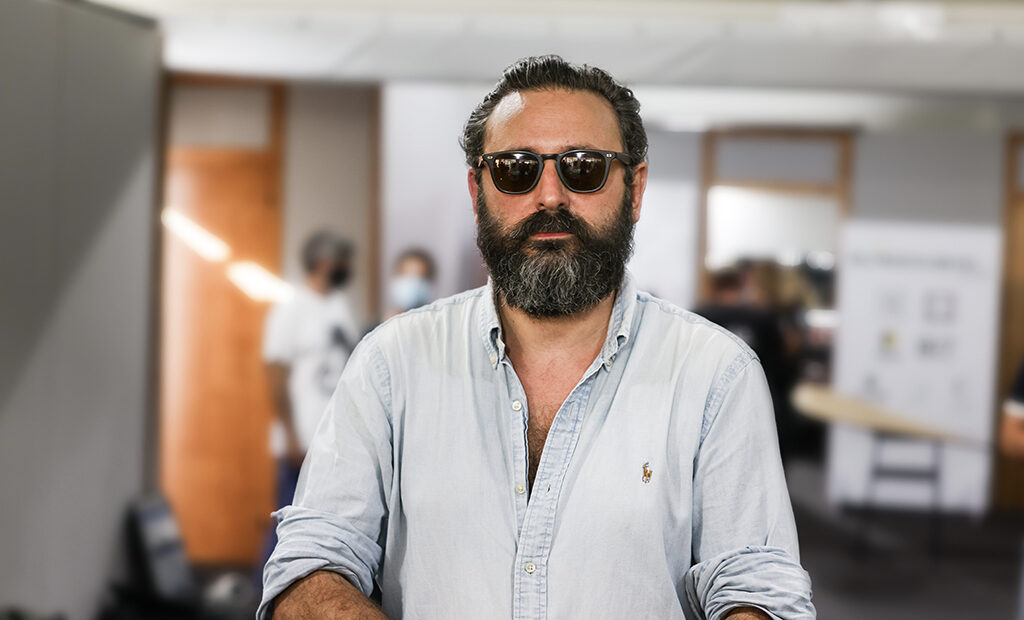
When simple-minded friends Jean-Gab and Manu find a giant fly trapped in the boot of a car, they decide to train it in the hope of making a lot of money. While attempting to make progress with the little monster, they embark on a crazy journey in Southern France. We spoke with director Quentin Dupieux about what inspired this surreal film and its unusual, funny characters.
Your lead in the film reminds me of the Dude in the Big Lebowski – was that an inspiration at any point?
Actually no, but I had another Cohen brothers movie in mind. When I wrote this one it was No Country for Old Men, only because the look of the film and the fact that they didn’t use any music, was to me a really interesting concept. This type of dry comedy, humour movie with no music, this is something I really enjoy. I didn’t try to do the same but that was the only movie in my mind when I was actually writing, which you can tell at the end because it’s just a feeling. I wanted to make a movie without any music, and I wanted the same kind of dry atmospheres. I don’t know if it makes sense.
So, visually too?
Visually it’s a mix. I remember we had a picture of an old movie with Brad Pitt where he has the same haircut there, and then, for David, we had some stupid photo of a random guy in a park with the same kind of haircut. That’s how we built the style, and then we tried some shirts, and then we looked at them, thought about it, and then we bought more different things. We tried many times, and then at the end, we built the character. The process was not like: “Oh! I like the Big Lebowski, let’s do the same.” It’s not like that. You know, we collect many kinds of inspirations, and at the end, it’s what you saw on the screen.
The fly is sort of similar to the monsters from 50s movies.
Yes, you’re absolutely right. I wanted this to be organic, because I grew up watching those kinds of movies. Even in the late 80s, monster movies were all made like this, CGI didn’t exist yet so I was watching all these stupid movies with rubber monsters. To me it was logical to go there, but also because I wanted this monster to have a connection with the comedians. The idea of shooting only with a green screen to make the fly on the computer later doesn’t make sense to me.
You wanted the monster to be touched.
Yes, I need a connection between the actors and the fly. So we did it the old school way: it’s a puppet. It’s a pretty complex sculpture, but in the end it’s a puppet. And theres a puppeteer inside with his arm and he does this, this and this. Then we recreated the legs with CGI. That’s all we did on CGI.
Why did you choose a fly specifically?
Everybody is asking! [laughs] When I did the movie Rubber, everybody was asking why a tire? I can’t tell why. there’s no reason. I have tons of ideas all the time, but when one of them stays, I know it’s because there’s something interesting about it. I don’t know why yet, but, you’re like: I have so many ideas that die all day long. You think about something but then you forget. And then there’s the fly idea – the giant fly idea – I had it a few years ago, and it kept coming back. In my head, I was like: “ah,” all the time. Basically the idea, the first idea, was a giant fly stuck in the trunk of a car, with some junk around it. I don’t know why. [laughs] I liked the idea of it so, then I had to build the story around it.
Can you talk about the sort of childish sweetness between the two friends? It reminds me of Beavis and Butt-Head.
Oui, Oui. Good reference.
They are like 14-year-olds. How did you develop that relationship?
It’s like Dumb and Dumber or Beavis and Butt-Head. They are like regular teenagers, not retard but… you know? They are 40 years old. You still see them as teenagers because they act together like they were 13 or 14. That’s the only thing that I didn’t write actually. We decided it on the set: “actually, they’re really young, like in their mind.” It was also in the dialogue, of course, everything was written, but not that childishness.
What about that super funny “toro” gesture?
That comes from my five years old daughter! She was having fun doing it and I figured out we could use it when we did it: “ah, this is pretty good.” Because, as you can see, I like childish things, the zone of the child.
Do you like to have lighthearted, funny films next to all the serious festival ones?
I don’t know. I have no judgement, everybody should be able to be on the schedule. There’s a lot of amazing new ideas everywhere, you just have to dig. I’m just lucky, it’s just a fact. I’m lucky to bring this type of movie to festivals. I’m not saying it’s only about luck, but there’s something in these movies that makes this combination possible. Like: “oh, funny!” Like a little special, but still festival-friendly. It’s pretty cool because other people do the same kind of thing, but they are not seen in festivals.
It also has to do with taking a comedy seriously, no?
Oui, oui. I am what you call an auteur, which means I write my film stuff and I have my own voice and this makes my movies connected all together so, it’s like: “oh, he’s an auteur.”
There is a darker moment though, when the fly eats…
The fly needed to eat, bigger animals eat smaller ones, is what’s happening every day in the forest. It’s normal.
The title does challenge audience expectations, because they’d expect blood and gore.
It’s a hard job because as you may know, flies don’t have mandibles. And the title is only here for the end, what you see in the suitcase. But yeah, that could have been a different version of the film, like: oh the fly is mean and the fly is going to kill some people. This would have been expected, though. I never thought about a mean fly, I knew this movie had to be light and funny and joyful.
Can you talk a bit about Roméo Elvis in this film? It’s his acting debut.
He was amazing because he was so happy to do this. He is used to playing on big stages, he is a big rap artist. So he is like a superstar, but on the other side he never played in a movie, so he was like a kid discovering a new toy. And it was really, really easy, because I would say he has it, he has the sparkle, he has the thing that makes a good character in a movie. With a director watching him he could be a really good actor.
How did you end up casting him?
I had many musicians in my movies as you may know, because I like to mix different kinds of people. I think it was an idea from the producer to go, probably. When he gave me the idea it was obvious, like: yeah, this works. He had the character already, I think. A guy like Marilyn Manson, you know he’s an actor, like instantly. You would dress him, you would give him a new shirt, a hat, and instantly he’s able to act. And if you say: no no, we will do it like this, oh let me move the camera, he’s already in the process of being a character. Because he’s on stage, and on stage you’re not like at home. You’re performing.
You created your own character too, as a musician.
I make music, and sometimes I DJ, yes, but it’s not the same job. These guys, they perform. It’s like they drum, they sing, they dance. I’m just pushing records. I could just look down and it would be fine. [laughs] I would be a terrible actor, for sure.
How do you work on dialogue? In the 90s these pairs of adults behaving like children were more popular. How did you want them to sound?
I think it’s a guy thing. This connection is like… I remember when I discovered Dumb and Dumber, I loved it and I wanted to show it to my girlfriend and she was like: pfft, this is just like teenagers, it’s not funny. And I was like: ah really? I thought this thing was universal, but it’s not. I think it’s just the way guys are stupid when they are between 12 and 18.
Does it actually stop?
It doesn’t stop, but when it’s like these guys in the film, it’s terrible. It’s like: you’re really dumb. I don’t know why it makes me laugh like this. Of course, it’s not only this, this can be great for only for a few minutes. After twenty minutes you’d want to go. It’s not enough, it’s just one piece. But then the fly is another piece, Adèle is another piece, then the tone of the movie is another piece.
There’s a fan base of Quentin Dupieux’s films right?
Yeah.
Can you talk also a little about Adèle Exarchopoulos’ character? What was your idea for her?
The idea was: I built these two guys but then, as I said, it wasn’t enough. You can’t tell a story with just two lunatics. So the idea was to find something crazier that made them look almost normal. That’s what happens in the movie, you get used to them and when she arrives she breaks everything and suddenly they look sweet. And this is funny I think.
But from the particularity of your films and the particular fan base for your films, is it easy for you to get that made?
Yes, honestly. Now I make one movie per year. It’s just a matter of writing and finding the right cast. My movies aren’t cheap or easy to finance, but it’s ok, they are doable and this one has been shot in six weeks. The next one I’m shooting is going to be seven weeks of shoot. Compared to any major French film it’s nothing.
And you have plenty of ideas.
That’s how my thing is possible. I’d rather make tonnes of small movies with small ideas in a way, rather than work five years on a big-budget movie where you write the script 50 times. This is not my thing. Some people do that very well, not me.
Do you feel like Roger Corman?
Yeah, but at the same time I would say no because he was not looking for quality, he was looking for money. I’m not looking for money, I’m looking for quality, so it’s different. I read his book and it’s all about making money like: “Oh I shot a film for 100 euros and then I made that much.” This is not interesting to me. I understand, I respect the guy but he’s a producer more than a creative person.
You mentioned your next project – we’re curious.
I’m starting this Monday. It’s hard to talk about. It’s in France, but it’s always the same, I need to shoot it before talking about it.
Is it going to be completely different?
Completely different. It’s with adults. No more teenagers. It’s new. But we’re talking about making a sequel to this of course.
Just talking about producing this movie, you were telling us it was not so simple to find the money for it, but my question is how do you pitch your ideas?
I’m not pitching, that’s the key. I find something I like, I trust. I write it without talking to anyone. I’m not like seducing a producer and going “Ah I might write a movie about a fly.” “Oh interesting, you should show me.” No, I go see my producer when I have a script and when it’s already something I really like and that I’m ready to shoot. It’s not like a project, it’s like a movie already. It’s perfectly structured, it’s ready to shoot, so they can think about it as a movie. Now these people trust me anyway. They know I know where I’m going and they know I won’t go over budget. They know I shoot fast and well, so it’s all a matter of trust but the first thing I do is I bring them a script, not a pitch cause you can’t finance a movie with a pitch. It’s not for me.
Do you think this film is just entertainment?
Oh, I hope it’s everything. Yes, I hope it is entertainment, like easy to watch but I hope it’s memorable. It’s not like a chewing gum. I hope it’s something enjoyable but then something you want to rewatch maybe, something you remember. I think it’s a little more than just entertaining. Just a little more.
Is this why you are using gimmicks in your movie?
I don’t know. I have to say I don’t know why I am doing this because it’s a little bit always like that. I think to me it’s a way of creating characters, maybe.
It also has to do with language?
Yes, that’s why I’m worried about the translation tonight but the subtitles were ok? It has to do with language and playing with words, even if it’s simple. But still, I spend time writing dialogues for sure. I love dialogues and I ask them to be sharp on the dialogues because it’s like music to me.
You say all your films belong to a universe. Is it by design?
They will fit, whatever happens. It’s not like I have to think about it. That’s the magic of being an autodidact, you know what I mean? I had to invent all this myself. I never read a book about scriptwriting, never.
When did that start?
I was 12. I was shooting terrible stuff. I was trying to reproduce horror movie scenes like: oh a guy with a knife [blows raspberries] oh blood, ketchup. At that time, my father had one of the first video cameras. It was like a big camera, plus there was the VCR. That was my only goal, after school, I wanted to use that camera to shoot scenes. Then it became more than scenes.
Everyone is over the top in this world of yours; how do you make sure that characters like Adéle can still feel like they are part of it?
That’s directing, it’s all about hearing, it’s like music. You take five musicians and if they sound bad together, you will hear it, for sure. Acting is the same. You can hear when five people are talking, it’s like music basically. You can precisely hear if they are connected together or if it’s fake or if one of them is off. You know, you just have to listen, and look at what’s in the eyes. But the sound is really important. Like music.
Now you are starting a new shoot but at this moment I imagine it’s really hard to start again, so how is it with the Covid situation – is it ok?
My technicians, they have to wear a mask, we have to wash our hands, we have to do some tests. I don’t even want to complain about this, like it’s one thing but it’s ok. It’s nothing compared to a war. It’s just, we are wearing masks, this is everywhere but it’s nothing. When you think about it it’s not a big deal.
How important is it for you to present your films at a festival? Do you need that kind of audience to get started?
It’s just part of the process. It’s a good way to get some attention, to say to the world: “Oh this movie with…” It’s also like a test, we are basically testing the movie even if it’s too late. I can’t change it, it’s done.
But you care a lot about the reaction here?
Yes, I care. I care, but tonight I’m not going to be nervous or like “oh my god”. I know that sometimes, some projections are like “so so”. Some are like crazy, amazing – people laugh too much almost. So it’s always different, it’s always interesting.
And with comedy especially, you need an audience to react to it, no? Because with American comedy they always test it, test it, test it.
Yeah, this is horrible to me. But it’s the same. Basically we are testing the movie. When you say: “Oh, everybody was laughing, it was good,” I need to tell it to the actor because we need to know all this. “Oh, people were laughing in the press screening.” It’s enjoyable.
And if they don’t, it’s not a good sign.
If they don’t, it’s scary, because then “oh bad press, bad buzz”. Maybe the audience won’t like it. To me, you’re not a journalist, you’re the audience. I don’t see you as someone special. To me, if you say “oh we had fun, it was funny, people were laughing”, I’m taking this as a compliment but as if you were just viewers. I’m not even happy because you’re a journalist. And it’s not just like, “oh yes, I’m going to have like nice papers online”. It’s like “oh yes, people get it!” And they have fun, and it’s cool, ’cause you’re basically, you’re all different here, so it doesn’t matter if it’s your job to watch or if you’re a carpenter or whatever.
I know that many many directors, whenever there’s a monster in the movie, they’re very afraid that people will look down on them immediately regardless of the story.
It’s maybe because there are other things; it’s not just a monster movie. I understand why monster movies should go to monster festivals. It’s because it’s all about “Oh blood” and I’m not doing this. I’m using a piece of this to make something else.
Filippo L’Astorina, the Editor
Photos: Filippo L’Astorina

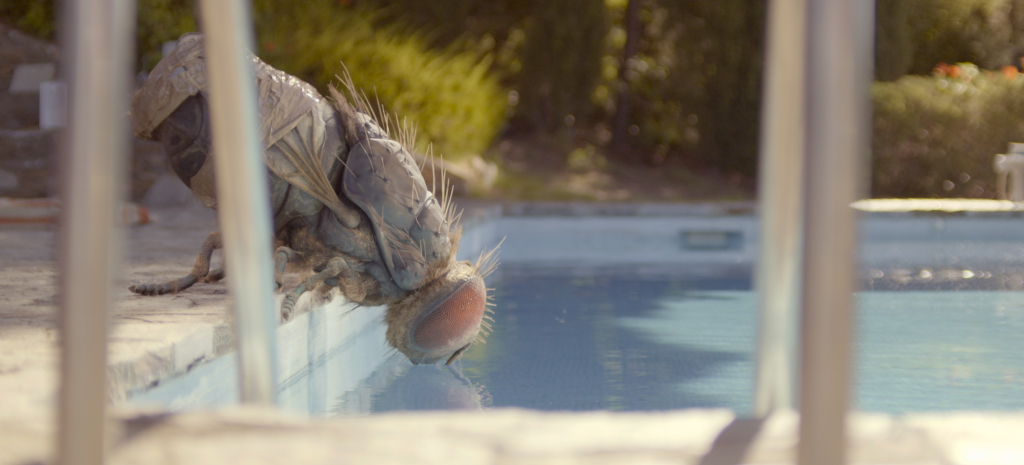
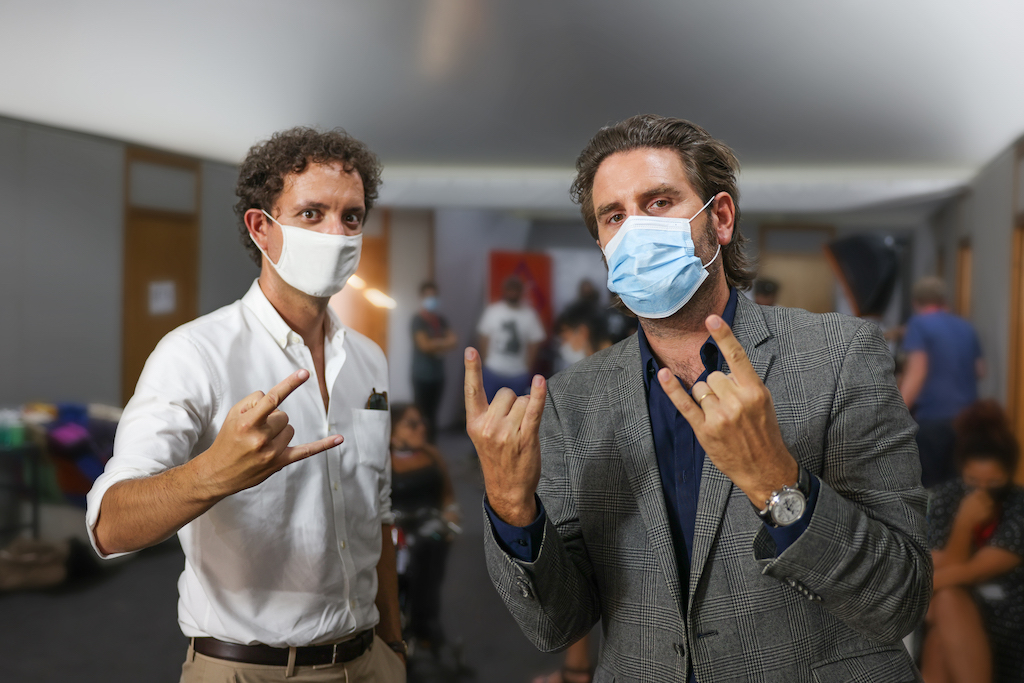
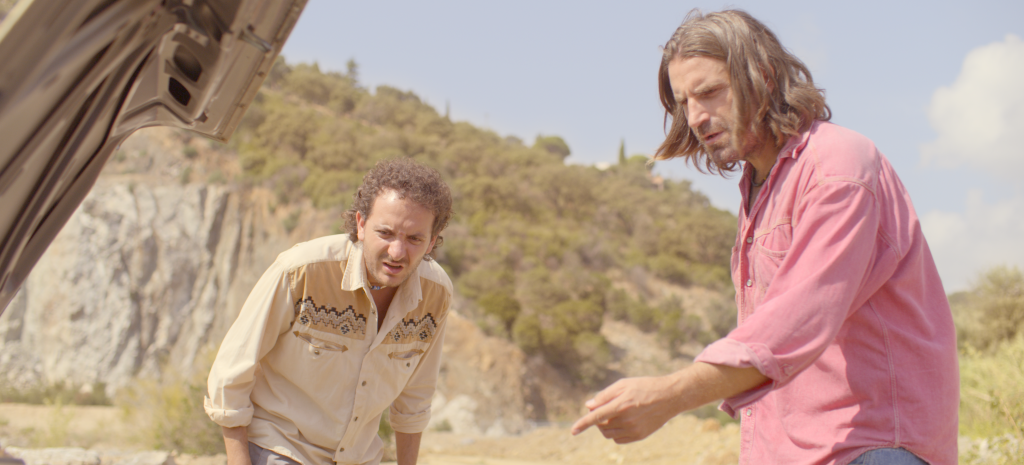
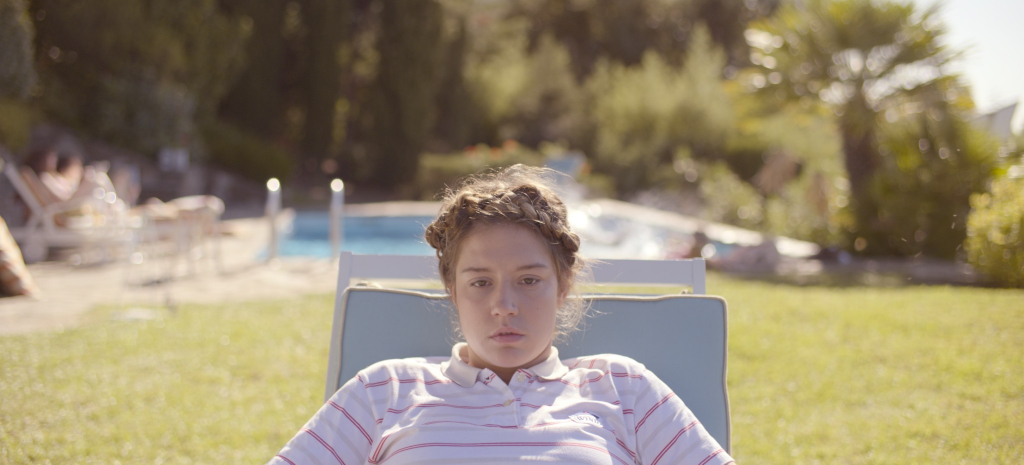













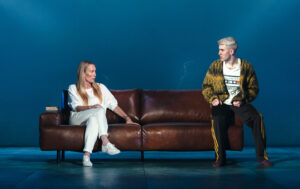









Facebook
Twitter
Instagram
YouTube
RSS